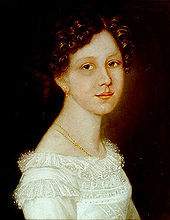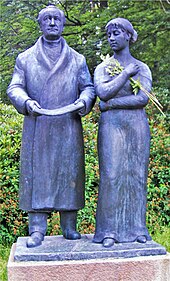Marienbad Elegy
Under the title “Trilogy of Passion”, Johann Wolfgang von Goethe summarized three poems for the first time in 1827, which were written at different times and for different occasions in 1823 and 1824. The middle poem of this trilogy is the Marienbader Elegy , a love poem, the occasion of which was Goethe's final separation from Ulrike von Levetzow .
background
In the summer of 1821, Johann Wolfgang von Goethe traveled to the Bohemian Marienbad for a spa stay . In search of distraction from the dreary everyday life, from the ailments of old age and from loneliness, he met seventeen-year-old naive and flirtatious Ulrike von Levetzow , who spent the summer in Marienbad with her mother and two younger sisters. In almost 72 years old Goethe, a great passion arose for the 54 years younger girl. Blind with love, he dared the almost unthinkable two summers later in 1823: with the help of his friend Grand Duke Carl August von Sachsen-Weimar-Eisenach , he asked Ulrike's mother, Amalie von Levetzow, in writing and formally, for the girl's hand. Carl August supported the proposal by promising the family a carefree life at his court. "No disapproval, no scolding makes love blameworthy," Goethe justified his efforts to Carl August. In 1823 he celebrated his 74th birthday with Ulrike von Levetzow in the Schwarzenberg Lusthaus (today "Hotel Weißes Ross"; Czech: Bílý kůň). A picture of this encounter can be found in Loket Castle (Elbogen). All the more shocking for Goethe, who was always favored by fate and who was lucky in love all his life, the polite refusal by Ulrike: “The young lady would not have any desire to marry” was the diplomatic message. This greatest personal defeat of Goethe was at the same time the climax of his creative power. After this bitter experience, the lover set a lyrical memorial to his reluctant love experience in the carriage after leaving Marienbad: the Marienbad Elegy, a lament which, according to Goethe, is “the product of a highly passionate state”.
This painful experience was at the same time the last experience of love in Goethe's life and sealed Goethe's farewell to love in general. The dwindling of man's ability to love, to whom Goethe accords a religious rank, is to be equated with death:
- All of this is to me, I am lost to myself
- Which I was still only darling to the gods;
- They tested me, gave me pandors
- So rich in goods, richer in danger;
- They pushed me to the forked mouth
-
They separate me and ruin me.
- (Closing stanza of the Marienbad Elegy)
reception
Johann Peter Eckermann sees the poem as the most personal testimony to Goethe's passion: “The most youthful ardor of love, softened by the moral height of the spirit, that seemed to me in general to be the pervasive character of the poem. Incidentally, it seemed to me as if the expressed feelings were stronger than we are used to encountering them in other poems by Goethe ... "
Stefan Zweig describes the lyrical document as the "most important, [...] personally most intimate [...] poem of its age" and dedicates a full chapter in his famous collection of historical miniatures great moments of mankind to its creation and history . For Zweig the verses contain "one of the purest stanzas about the feeling of devotion and love that German and any language ever created":
- A striving surges in our bosom,
- To a higher, purer, unknown
- To give freely out of gratitude,
- Unraveling the eternally unnamed;
- We say: be pious! - Such a blessed height
-
I feel partaking when I stand in front of her.
- (Excerpt from the Marienbad Elegy)
Otto Erich Hartleben, on the other hand, turned against the "hideous poem [...] The devil is supposed to get this fluffed hollow straw. 'In action, be for joy, be in love' - if patience does not run out - God damn me! That is a disgusting carelessness and nothing more. "
literature
- Friedemann Needy : The loveliest of the loveliest figures. Ulrike von Levetzow and Goethe (= Rororo 23849). Rowohlt-Taschenbuch-Verlag, Reinbek near Hamburg 2005, ISBN 3-499-23849-7 .
- Dagmar von Gersdorff : Goethe's late love. The story of Ulrike von Levetzow (= Insel-Bücherei. No. 1265). Insel Verlag, Frankfurt am Main et al. 2005, ISBN 3-458-19265-4 .
- Johann Wolfgang v. Goethe, Ulrike von Levetzow: "... It wasn't a love affair". A collection of texts. Edited by Jochen Klauß. Manesse-Verlag, Zurich 1997, ISBN 3-7175-8224-0 .
- Sebastian Kaufmann: "The poet's pure hand ..." Studies on Goethe's poetological poetry (= contributions to modern literary history. Vol. 291). Winter, Heidelberg 2011, ISBN 978-3-8253-5916-4 , pp. 413–472 (Simultaneously: Freiburg (Breisgau), Univ., Diss., 2011), (Detailed interpretation of the elegy in the context of the entire trilogy of passion ).
- Astrid Seele: Women around Goethe (= Rororo 50636 Rowohlt's monographs ). Revised new edition. Rowohlt, Reinbek near Hamburg 2000, ISBN 3-499-50636-X .
- Martin Walser : A loving man. Novel. Rowohlt, Reinbek bei Hamburg 2008, ISBN 978-3-498-07363-3 (literary fiction about Goethe's relationship with Ulrike.)
- Stefan Zweig : The Marienbad Elegy. In: Great moments of mankind . 12 historical miniatures (= Fischer-Bücherei. Vol. 595). Unabridged edition. Fischer, Frankfurt am Main et al. 1964 ( E-Text )
Web links
Individual evidence
- ^ Johann Wolfgang von Goethe: Berlin edition. Poetic Works, Volume 1, Berlin 1960 ff., Pp. 497–502.
- ^ A b Johann Peter Eckermann, Conversations with Goethe in the last years of his life , entry from November 16, 1823. (Online at Projekt Gutenberg)
- ^ Stefan Zweig: The Marienbader Elegy. In: Great moments of mankind.
- ^ Otto Erich Hartleben: To Otto Pniower, 12. III. 1901. In: Letters to Friends. 1912, p. 286 ff.




